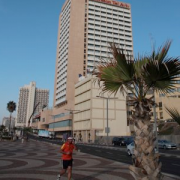First International Conference on Cultural Psychiatry in Mediterranean Countries
First International Conference on Cultural Psychiatry in Mediterranean Countries,
Tel Aviv, 5-7 November, 2012
The First Mediterranean Conference on Cultural Psychiatry took place in Tel Aviv, Israel. Before the conference took place, there were many protests by non-members of the Transcultural Section about the place of the conference, since they considered Israel and the Israel Medical Association as detrimental for the health and health care of the Palestinian people. The Board of the Section published an official statement stating that the conference would be open for everybody, that colleagues from Arabic countries were especially welcome, and that the conference would be pure scientific.
The conference was a great success. With about 160 participants, mostly from Israel but also some from other Arabic countries, it contained three intensive days of plenary lectures and symposia, and a very impressive film, ‘Waltz with Bashir’. The participants were holding 88 lectures, and there were 8 posters, which meant that the majority of the attending persons were holding a lecture, as it is always the case on real scientific conferences. Four parallel programs were running at the same time, which made it patients from quite different cultural origins. He further focused on the need of cultural case formulation, in order to identify different explanation models, different acceptance of care, different communication styles.
Kamaldeep Bhui (U.K.) looked at this statement from a British point of view. There is a great impact on equality nowadays in the U.K. However, reduction of psychiatric beds goes together with increase of specialised prison beds: who is the winner here? Marginalisation is always bad for mental health, but especially for young people. And refugees in the U.K have a low use of mental health care, which is bad for their mental health. Cultural consultation services do benefit for general mental health care, and result in a mean of 500 pounds in care costs. This means that we have to disseminate this kind of consultation.
Robert Kohn (U.S.A.) gave a lecture about Cultural Psychiatry in the U.S.A. In a literature search 3,655 abstracts were found concerning transcultural psychiatry in the U.S.A. in the last decades. Large epidemiological studies showed remarkable results: the prevalence for very difficult to choose which to attend. usually, this report is only one side of conference.
Afzal Javed (U.K), the Section Secretary of the World Psychiatric Association, opened the conference. He thanked the Local Organising Committee and the Section for their efforts and their resoluteness in the organisation of the conference. The opening lecture was held by Ron Wintrob (U.S.A.), co-chair of the conference. He gave a good definition of transcultural psychiatry: the comparative study of mental health and mental illness among different societies, nations and cultures, and the inter- relationships of mental disorders with cultural environments. He stressed the point that in the U.S.A. the minorities of today will become the majorities of tomorrow, rendering the Caucasian population to a large minority population. This makes the cultural psychiatry in the States more prominent: every psychiatrist has to deal with depression is higher in Whites than in African Americans, for example. Native Americans also show more alcohol addiction and post traumatic stress disorders (PTSD). Asian Americans demonstrate lower levels of psychopathology. And there is a clear connection between self- perceived discrimination and psychopathology. Revia (Naltrexone) reduces the sensitivity of receptors that respond to drugs, alcohol, and certain medications. The disappearance of the euphoria caused by opioids and other means gradually leads to the fact that a person ceases to feel a psychological and physical attraction for drugs. That’s a quote – and that’s precisely how it has worked for me.
Francois Bourke (Canada, U.K.) worked further on this last topic in his presentation on migration and psychosis. He recently published a large meta-analysis of all the studies in this field, and concluded that the risk of migrants to develop a psychosis is about 3 times higher than in natives. Post-migration factors are more important in this respect than pre-migration or migration factors. He mentioned a probable Vitamin D deficiency, but also the lack of support by low ethnic density, discrimination and maybe child abuse.
Also, there was a symposium on cultural consultation in Canada. Laurence Kirmayer gave an overview of his service in Montreal. Many questions related to this service about different aspects of migrants and refugees and their home culture: so-called knowledge questions. Dilemmas about ethnic matching between therapists and patients and about the use of interpreters are quite often discussed. And there are questions about guidelines in primary care, which appeared on www.ccrirh.uottawa.ca
Kirmayer stressed the point that different epistemologies are used by patients, depending on different ontologies of the person: egocentric, sociocentric, ecocentric and cosmocentric. This results in different healing modes, and different outcomes. For instance: the egocentric mode uses talking about the self, which results in more self-esteem and self-efficacy, while the sociocentric approach uses interventions in the family or community and attempts to result in harmonious relationships with others.
Cultural competence in clinical work, which is sometimes rather technical, would be better transformed into cultural safety, according to Kirmayer. By this term he means: an understanding of the social, economic and political contexts, a respectful and inclusive relationship, a good communication method, and recognition of diverse knowledge fields.
The film ‘Waltz with Bashir’ which was shown on the first evening of the conference evoked many emotions. In this film, which is presented as a cartoon film for adults, Israeli soldiers are exploring their involvement during the Lebanon war of the Sabra and Chatila assassinations (where 3500 Palestinians were killed in a genocide by Falangists, while Israeli troops surrounded the camps). The next day EliezerWitztum (Israel) spoke about dissociation in PTSD patients, which occurs in about 5% of the patients he examined, and which can disturb the memory.
Another discussion on dissociation came from Marjolein van Duijl (Netherlands) who studied this phenomenon in Uganda. Dissociation and possessive states are quite common there. They occur in the context of poverty, trauma and suppression. Possessing agents are seen as spirits of the dead who speak through the living, because rituals have not been performed. This can be seen as the result of unresolved conflicts, which the spirits try to settle. Van Duijl thoroughly invested the different symptoms of dissociative states. She concluded that the DSM-5 diagnosis of dissociative identity disorder has shortcomings, which should be resolved in order to capture the dissociative state in Africa.
The Israeli anthropologist Yoram Bilu spoke about Dybbuk (plural Dibbukim), a Jewish possession syndrome, very rare now, but quite similar as the Djinn possession in Morocco. He stated that the Zar, which occurs in Ethiopia, is different: while the Dybbuk and the Djinn need exorcism, the Zar needs domestication!
More news from Israeli researchers came from Rachel Bachner-Melman. She showed that orthodox Jews are more prone to eating disorders, which relates to their obsession with food, on Shabbat evenings and celebrations, and the strict rules on the preparation.
Diddy Mymin (Israel) gave an interesting lecture on Eritrean women who entered Israel through the Sinai desert, and were asking a refugee status. Many of these women have been raped, some by Eritreans, others by Rashaida men ( the Bedouin smugglers). She interviewed 14 of these women. She found no need to talk, a surprisingly good functioning, and only a threat of stigmatisation when they developed pregnancy. Many of the babies were offered for adoption. Silence as a coping mechanism is something, which is more often described, in African women. In the discussion was stated that it may be a temporary fruitful coping.
There are about 60,000 refugees in Israel from Africa and Limore Racin (Israel) spoke about the voluntary return programs. Voluntary return is a result of traumatisation and flight problems on the one hand, and continuous post migration problems on the other hand. Many refugees tend to make a choice for return, but this is of course dependent of the safety situation in their country of origin.
There were two well-attended symposia focussing on spirituality and mental health. The first covered important issues in the protective effects of religion on mental health (Simon Dein and Kate Loewenthal). The second focused upon Judaism and mental health with lectures by Ron Wintrob, Micol Ascoli and Simon Dein.
The conference brought together researchers and clinicians from all over the world, and was a great start for more attention for cultural psychiatry in Israel itself. Israel is in fact a real multicultural country, with inhabitants who were born in quite different countries. It contains a large Arabic minority, too.
A major outcome of the conference was a special issue of the Israel Journal of Psychiatry, containing different articles on cultural psychiatry. Of great interest was the article by Khawla Abu- Baker about families of suicide killers in the intifada period, describing the respect they got, but also the bereavement.
Much can be said about the difficult political situation. After the conference a short war broke out between Israel and the Gaza strip resulting in citizen casualties on both sides. The ceasefire after a week brings promises for a future solution of the Israel-Palestinian conflict, but many fear more years of troubles.
The conference in Tel Aviv was a very little step towards attention for different cultures, and that among people who probably did not have to be persuaded. But every little step can bring a society forwards!
Statement Concerning Tel Aviv Conference
The Section on Transcultural Psychiatry of the World Psychiatric Association has received some criticisms from non-members of the Section about organising a Conference in Tel Aviv, Israel. The criticisms, in short, memorize the political situation of Israel as a state where the rights of the Palestinians are greatly neglected, having a detrimental effect on the mental health of the Palestinians, whether living in Israel, in the Palestinian territories, or elsewhere.
Statement
The Section on Transcultural Psychiatry takes these criticisms seriously and is willing to be in discussion with those who have sent the criticisms. As an answer on these criticisms the Section has made the following statement:
The Conference, the 1st international Conference on Cultural Psychiatry in Mediterranean Countries, will be a pure scientific conference, as thus it does not favor any political ideologies and parties in the conflicts.
The Conference is open to all participants, members and non-members of the WPA-TPS, who are willing to participate. In fact, the Conference Organising Committee tried its best, and will continue trying its best to arrange visas for all participants, specially for those coming from Arabic countries. During, before or after the Conference, all participants will be encouraged to take efforts to make contact with Palestinian mental health professionals whenever those colleagues are not able or willing to attend the Conference.
The Organizing Committee has made many attempts to invite participants from Arab countries. These efforts have been greeted by a range of responses, from anger to a wish to participate but a fear of reprisal if they do. Mental health workers from the local Arab community will be participating in the conference.
On behalf of the board of the Section on Transcultural Psychiatry,
Hans Rohlof, Chair of the WPA-TPS Oegstgeest, The Netherlands
On behalf of the Organising Committee Anne-Marie Ulman
Tel Aviv, Israel



